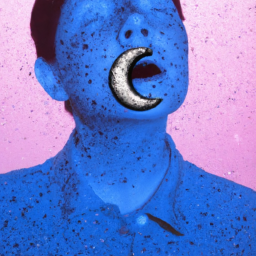Have you ever experienced a nightmare in which you tried to scream for help but no sound would come out? It can be a truly terrifying experience. But have you ever pondered why we are unable to produce any noise in our dreams, despite our efforts?
I understand the science behind dreaming and the brain’s connection to speech and vocalization. In this article, I will explore the reasons why we can’t scream in our dreams, the emotional experience of nightmares, the evolutionary purpose of dreaming, and some tips for managing those scary dreams.
So if you’re curious about the mysteries of your subconscious mind, keep reading!
Key Takeaways
- Sleep paralysis disconnects signals from the brain to vocal muscles, preventing us from screaming or speaking in dreams.
- Inability to scream or speak in dreams serves an evolutionary purpose to protect us from harmful movements.
- Broca’s area, responsible for language and vocalization, is less active during REM sleep, making it difficult to form coherent speech or vocalize in dreams.
- Nightmares can be caused by underlying mental health issues, medications/substances, or sleep disorders, and seeking professional help can aid in reducing nightmares.
The Science Behind Dreaming
Dreaming is a mysterious process that involves the brain creating vivid and often fantastical experiences while we sleep. These dreams often feel so real that it can be difficult to distinguish them from reality.
However, despite the fact that we can perceive sight, sound, touch, and even taste in our dreams, we are unable to scream. The reason for this lies in the brain’s connection to speech and vocalization.
When we speak or make noise, our brain sends signals to the muscles in our vocal cords, larynx, and mouth to produce the desired sound. However, during sleep, our brain disconnects these signals to prevent us from acting out our dreams.
This is known as sleep paralysis, which is a normal part of the sleep cycle. So, even though we may be able to perceive danger in our dreams and want to scream, our brains prevent us from actually doing so.
The Brain’s Connection to Speech and Vocalization
Our brains are wired to activate specific muscles for speech and vocalization, even when we’re not consciously aware of it. This means that even when we’re in a dream state, our brains are still sending signals to our vocal cords, mouth, and tongue to make sounds and speak. However, these signals aren’t always strong enough to produce audible speech, which is why we may not be able to scream or talk in our dreams.
The brain’s connection to speech and vocalization in dreams is an interesting area of study, but it also raises questions about the emotional experience of dreams. How is it that we can experience intense fear or excitement in a dream, yet not be able to express it through screams or shouts?
This will be explored in the subsequent section about the emotional experience of dreams.
The Emotional Experience of Dreams
As I slip into the world of dreams, the emotions I experience can be just as intense as real life, yet often lack the ability to be expressed in physical ways. I may feel overwhelming sadness, fear, or anger, but my dream self is unable to scream or cry out in response.
It’s as though my vocal cords are paralyzed, leaving me with no choice but to experience these emotions in silence. This lack of vocalization in dreams is thought to be connected to the fact that our brains shut down certain motor functions during sleep.
However, it’s also possible that this inability to scream or speak in dreams serves an evolutionary purpose. By limiting our ability to physically react to dream stimuli, our brains may be protecting us from potentially harmful movements or actions while we sleep.
The Evolutionary Purpose of Dreaming
When you slip into the world of dreams, your brain may be protecting you from potentially harmful movements or actions while you sleep by limiting your ability to physically react to dream stimuli. This protective mechanism is believed to have evolved as a survival strategy to prevent injury or harm to ourselves or others during sleep.
In other words, our brains may be inhibiting our ability to scream or physically react in our dreams to ensure that we remain still and undisturbed during the night. But why specifically can’t we scream in our dreams?
One theory suggests that the part of the brain responsible for language and vocalization, the Broca’s area, is less active during REM sleep, the stage in which most dreams occur. This limited activity in the Broca’s area may make it difficult for us to form coherent speech or vocalize in our dreams.
So, while it may be frustrating to be unable to scream or call for help in a nightmare, it may ultimately be a protective mechanism to ensure a peaceful and safe night’s sleep.
While we may not be able to physically react in our dreams, there are ways to manage and cope with nightmares.
Tips for Managing Nightmares
When it comes to managing nightmares, I’ve found that there are a few key tips that have been helpful for me.
Firstly, practicing stress reduction techniques such as meditation or deep breathing can help calm the mind before bed.
Additionally, creating a relaxing sleep environment with comfortable bedding and a cool temperature can also aid in reducing nightmares.
Finally, it’s important to seek professional help if nightmares persist and begin to interfere with daily life.
Practicing Stress Reduction Techniques
Using stress reduction techniques can help me relax and manage high levels of anxiety, which is why it’s important for me to incorporate them into my daily routine. Practicing these techniques regularly can lower my overall stress levels and make it easier for me to fall asleep without being consumed by negative thoughts. One technique that I find particularly helpful is deep breathing exercises. When I take slow, deep breaths and focus on my breathing pattern, I feel my body begin to relax and my mind quiet down.
Another technique that is helpful for me is mindfulness meditation. This involves sitting in a quiet place and focusing on the present moment without judgment. This can be done by focusing on my breath, or by observing my thoughts without getting caught up in them. To help visualize the benefits of mindfulness meditation, I have created a simple table below:
| Before Meditation | During Meditation | After Meditation |
|---|---|---|
| Racing Thoughts | Focused Attention | Calm Mind |
| Tense Muscles | Relaxed Body | Reduced Physical Tension |
| Feeling Overwhelmed | Centered and Grounded | Increased Clarity |
By incorporating these stress reduction techniques into my daily routine, I am able to create a more relaxed and peaceful environment for myself. This can help me fall asleep more easily and experience fewer nightmares. Creating a relaxing sleep environment is the next step in managing my nightmares.
Creating a Relaxing Sleep Environment
To truly overcome my nightmares, I must create an atmosphere that promotes relaxation and calmness in my bedroom. This means making sure my room is dark, cool, and quiet. I can also use calming scents, such as lavender, to help me relax.
Additionally, I should remove any distractions from my bedroom, such as electronics or clutter. Creating a relaxing sleep environment can help me reduce stress and anxiety, which may ultimately lead to less frequent and intense nightmares.
However, if my nightmares persist despite my efforts to create a peaceful sleep environment, seeking professional help may be necessary. A therapist or counselor can help me address any underlying psychological issues that may be causing my nightmares and provide additional tools and strategies for managing them.
Seeking Professional Help When Necessary
If nightmares persist despite efforts to create a calming sleep environment, seeking professional help may be necessary. Studies show that approximately 50% of adults experience nightmares at least once a month, with 2-8% experiencing nightmares that cause significant distress or impairment. Here are some reasons why seeking professional help for nightmares might be the right choice:
- Nightmares can be caused by underlying mental health issues, such as anxiety or post-traumatic stress disorder (PTSD).
- Certain medications or substances, such as antidepressants or alcohol, can also contribute to nightmares.
- Sleep disorders, such as sleep apnea or restless leg syndrome, can disrupt sleep and increase the likelihood of nightmares.
Therapy, such as cognitive behavioral therapy or exposure therapy, can help individuals process and overcome traumatic experiences that may be causing nightmares. In some cases, medication may be prescribed to help manage nightmares and improve overall sleep quality.
It’s important to remember that seeking professional help for nightmares is not a sign of weakness, but rather a proactive step towards improving one’s mental and physical health. If nightmares are causing significant distress or impairment, don’t hesitate to reach out to a healthcare professional for guidance and support.
Frequently Asked Questions
How can lucid dreaming affect the ability to scream in a dream?
Lucid dreaming can give me control over my dream environment, including the ability to scream. However, the inability to scream in a dream may still occur due to the brain’s suppression of physical movements during sleep.
Can sleep disorders such as sleep apnea or insomnia affect the ability to scream in a dream?
Sleep disorders like sleep apnea or insomnia may affect the ability to scream in a dream. It’s like trying to shout in quicksand – the harder you try, the more difficult it becomes.
Is it possible for people who are mute in waking life to scream in their dreams?
As someone who is mute in waking life, I can confirm that it is possible to scream in dreams. While I cannot speak in reality, my mind is still capable of producing vocalization in the dream world.
Can certain medications or substances affect the ability to scream in a dream?
Certain medications and substances can affect the ability to scream in a dream. Sedatives, antidepressants, and alcohol can suppress the body’s natural response to scream. This may result in a person feeling unable to scream or yell in their dreams.
Are there any cultural or societal factors that could influence the ability to scream in a dream?
I wonder if cultural or societal factors could impact our ability to scream in dreams. Perhaps some societies value silence or repress emotions, leading to the inability to scream even in dream state.
Conclusion
So, why can’t I scream in my dreams? It all comes down to the way our brains process information during sleep. While we may experience vivid emotions and sensations in our dreams, our ability to vocalize is limited due to the disconnect between the brain’s speech centers and the muscles responsible for producing sound.
But just because we can’t scream in our dreams doesn’t mean they aren’t important. In fact, dreaming may serve an evolutionary purpose in helping us process emotions and experiences from our waking lives.
By understanding the science behind dreaming and learning to manage nightmares, we can tap into the power of our subconscious minds and unlock a world of insight and self-discovery.









